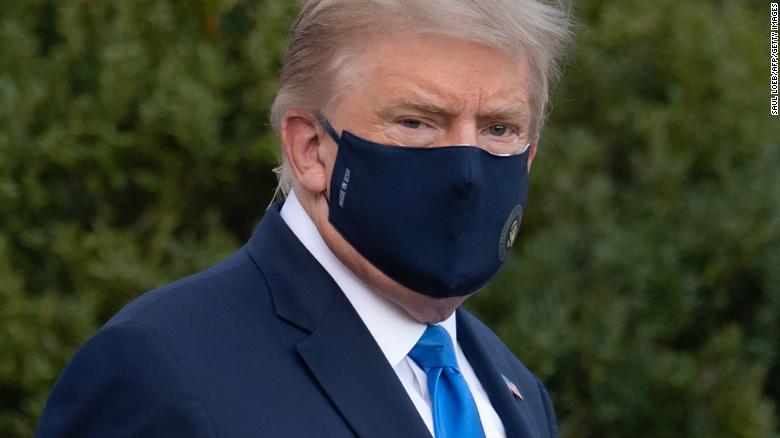begin quote from:
https://www.cnn.com/2020/10/03/politics/donald-trump-coronavirus-walter-reed/index.html
Source tells reporters: Next 48 hours will be critical for Trump

By Maeve Reston, CNN
Updated 12:49 PM ET, Sat October 3, 2020
(CNN)The next 48 hours will be critical for President Donald Trump as he fights Covid-19, a source familiar with the President's health told reporters.
"The President's vitals over last 24 hours were very concerning and the next 48 hours will be critical in terms of his care. We are still not on a clear path to a full recovery," the source told White House pool reporters after the briefing from his doctors.
On Saturday morning, the President's physician, Navy Cmdr. Dr. Sean Conley, gave a confusing update on the President's Covid-19 condition that only raised more questions about the timeline of the President's illness.
The briefing came the morning after Trump was transported to Walter Reed National Military Medical Center, which raised concerns.
His admission to the hospital early Friday evening, less than 24 hours after news broke of his Covid-19 diagnosis, plunged the country into a deepening crisis as the circle of current and former aides to the President testing positive rapidly widened.
Conley described the President's symptoms as an "extremely mild cough," nasal congestion and fatigue -- "all of which are resolving and improving," he said.
Conley gave a confusing series of answers about whether the President had been on supplemental oxygen, but ultimately said he had not received supplemental oxygen while at Walter Reed. Another doctor said the President is not having difficulty breathing or walking, and told doctors: "I feel like I could walk out of here today."
Sources told CNN previously the President was running a low fever.
Conley refused to pinpoint when doctors believe President contracted the virus, or when he had his last negative Covid-19 test this week or how many people in the President's orbit may have been exposed given that Trump rarely wears a mask.
Though Conley gave Trump a good prognosis, the treatments administered to the President in the past 24 hours have raised the level of concern about his condition.
While the President was still at the White House, he was administered the experimental Regeneron polyclonal antibody cocktail, a promising treatment that has not yet been approved by the Food and Drug Administration that was intended to help boost the President's immune system as he fights the virus.
Once at Walter Reed, Conley said doctors initiated the antiviral drug remdesivir, which has been shown to shorten recovery time for some coronavirus patients.
A widening circle
Conley briefed the press about fourteen hours after Trump was taken to Walter Reed. The President revealed his Covid-19 diagnosis early Friday morning.
In the hours that followed, the circle of current and former aides to the President testing positive rapidly widened. By early Saturday, former White House counselor Kellyanne Conway and the President's campaign manager Bill Stepien had both tested positive, which followed the positive diagnoses of two US senators who had attended Trump's Supreme Court nomination announcement last weekend, and Trump senior adviser Hope Hicks on Thursday. A third Republican US senator, who did not attend the nomination event, announced a positive diagnosis later Saturday morning. Former New Jersey Gov. Chris Christie, who had helped the President with debate preparations, also announced he had tested positive on Saturday.
It was a remarkably fast escalation of the virus' threat -- which the President has long downplayed -- from an infection that caused him mild symptoms, to a fever to then being airlifted to the hospital, all while spreading quickly throughout the government and his campaign.
The President's physician, Conley finally gave an update on the President's condition, saying in a memo that the President is "doing very well" and has not required any supplemental oxygen, but that doctors have initiated the antiviral drug remdesivir, which has been shown to shorten recovery time for some coronavirus patients.
Conley added that he had recommended the President's movement from the White House to Walter Reed earlier Friday in consultation with specialists from both Walter Reed and Johns Hopkins University.
Around the same time, Trump tweeted: "Going well, I think! Thank you to all. LOVE!!!"
Trump's diagnosis -- followed by his move to Walter Reed, where the White House said he plans to stay and work for "the next few days" -- presented the most serious known health threat to the US presidency since former President Ronald Reagan was non-fatally shot in 1981.
The decision to take Trump to the hospital marked a sharp turn from the statement Conley made early Friday when he first confirmed the Covid-19 diagnosis of Trump and first lady Melania Trump, and said the couple would remain at the White House during their convalescence.
Wearing a suit and mask, Trump, who's 74, gave a low-key wave to the press but took no questions as he walked without assistance across the South Lawn of the White House to Marine One, the helicopter that airlifted him to the hospital. He left for Walter Reed after receiving a dose of an experimental antibody cocktail -- which may have signaled a rising level of concern among his physicians, Dr. Jonathan Reiner, CNN medical analyst and professor at George Washington University, told CNN on Friday.
Though White House staff claimed the President made the move "out of an abundance of caution," there were still more questions than answers about the President's condition on Friday, in part because of the consistent lack of transparency from this White House and the fact that his physicians have not briefed the press, which has been typical protocol when past presidents have faced health concerns.
White House officials underscored that the President has not transferred power to Vice President Mike Pence, as is sometimes customary when a president is ill or scheduled to undergo a procedure that could require anesthesia.
The President "is in charge," a White House communications aide said Friday, and Trump released a short recorded video on Twitter thanking his supporters for their well wishes as he arrived at Walter Reed shortly before 6:30 p.m. ET.
"I want to thank everybody for the tremendous support. I'm going to Walter Reed Hospital. I think I'm doing very well," Trump said in the 18-second video, which was notable for its brevity. "We're going to make sure that things work out. The first lady is doing very well. So thank you very much, I appreciate it. I will never forget it. Thank you."
Melania Trump remained at the White House with what the White House physician described as a mild cough and a headache.
But her husband's age, his sex and the fact that he is clinically obese put him at greater risk of complications from the virus. It was unclear exactly when the couple was tested and how long they could have been contagious.
The incubation period for the virus is estimated to be anywhere between five and 14 days, according to the US Centers for Disease Control and Prevention, and the agency's guidelines say that anyone exposed to the virus should quarantine for 14 days.
A pattern of dismissing the virus
Following the same recklessness the President has shown throughout the pandemic, Trump decided to go to a campaign fundraiser in Bedminster, New Jersey, Thursday evening even though he had learned before the trip that Hicks, one of his senior aides who had traveled with him throughout the week, had tested positive for the virus.
The President not only traveled earlier in the week to the first presidential debate with Biden, who tested negative on Friday, but he also attended several campaign rallies over the past week.



















No comments:
Post a Comment